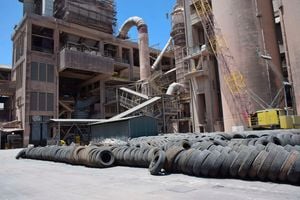
Bags of cement. Substandard cement, most of which contains non-cementitious materials, has been seized in a sting operation.
Kenyans are using substandard cement, most of which contains non-cementitious materials and weighs less than its declared weight – in some cases by as much as 17 kilogrammes, a multi-agency sting operation has revealed.
The damning revelations follow a crackdown that uncovered a web of illegal cement cartels involved in the production and sale of fake and substandard cement, with hotspots in Athi River, Syokimau and Kitengela.
The operation, which resulted in the arrest of 13 suspects, further revealed how major cement brands are being targeted by the intricate network at the centre of the production and distribution of the adulterated cement.
After testing 1,774 bags seized, it was established that the brands affected by the activities of the cartels include Bamburi Cement, Simba Cement, Blue Triangle and Mombasa Cement. This raises questions about the safety of buildings in the country.
The crackdown over the past few days was carried out by the Kenya Bureau of Standards (KEBS), the Directorate of Criminal Investigations (DCI), the Anti-Counterfeit Authority and the National Construction Authority.
Worryingly, the investigations revealed that rogue employees, especially drivers of the affected companies, had colluded with unscrupulous businessmen strategically placed along the transport routes, who illegally repackaged the cargo and shared the profits among themselves.
The perpetrators, most of whom own hardware stores, then sell the substandard cement to unsuspecting customers.
“The repackaged cement has not only been found to be way less than the declared weight of 50kg, but also contained non-cementing material such as pozzolanic dust, which greatly reduces the quality of cement,” said Kebs.
“During the operation, 13 suspects were arrested and will be arraigned in court to face charges related to the illegal activities.”
Eight lorries were intercepted while loaded with the siphoned, adulterated and repackaged bags of cement of major brands.
In one of the lorries, loaded with 222 bags, it was found that most of the bags weighed 43.5kg and none weighed the recommended 50kg.
Another lorry with 83 bags had some bags weighing 39.65kg, others 39.45kg and the highest 50.5kg.
The weights ranged from a low of 17.05kg to 58.3kg, with most bags weighing less than 40kg.
Kebs' investigation revealed that genuine cement was being siphoned from properly packaged bags, repackaged in counterfeit bags and sold to unsuspecting Kenyans.
The adulteration also involved the use of pozzolanic dust, which significantly reduces the quality and performance of the cement.
Pozzolanic dust is a finely powdered solid waste material containing high levels of silica and/or alumina.
The adulterated cement is then repackaged in counterfeit packaging bearing the logos of reputable cement brands to facilitate the distribution of substandard products.
According to Kebs, some of the packaging bags, which do not originate from the manufacturers, were dated 2025 but without batch numbers, meaning that the daring cartel had the prospect of distributing the substandard building material to various construction sites across the country.
“Instances include several seized counterfeit bags of Mombasa Cement, which lacked batch numbers; were dated 2025; didn't have the correct corporate colours of the company; and weighed as low as 38kg per bag. Luckily, the materials used to syphon the cement were also confiscated and kept as exhibits,” the standards agency said.
Kebs Director of Market Surveillance, Peter Kaigwara, said the illegal activities not only deceive consumers but also jeopardise the safety and structural integrity of buildings, leading to potential loss of lives and investments when structures collapse.
In recent years, the construction industry has been threatened by substandard, counterfeit and adulterated cement products that compromise the safety and integrity of buildings and infrastructure.
The products, which are often marketed at lower prices, pose significant risks to consumers, contractors and the general public.
In addition, unscrupulous operators also undercut legitimate operators, creating an uneven playing field and undermining fair competition.
Mr Kaigwara said counterfeit and adulterated cement does not meet quality standards and often contains substandard materials, resulting in weaker cement that can compromise the durability and stability of structures.
“The results of their felonious activities are huge losses to the genuine manufacturers, poor quality construction works and the numerous lives lost when buildings collapse,” said Mr Kaigwara.
“We wish to caution members of the public especially those undertaking construction works that some of their preferred brands may have been counterfeited or interfered with, and hence should ensure due diligence when making purchases in order to get value for their money,” he added.
In an effort to curb these illegal activities, Kebs will continue to work closely with regulators, law enforcement agencies and industry associations to combat the illegal production and distribution of counterfeit cement.
The agency is also strengthening its market surveillance and testing procedures to ensure that all cement products meet the required quality standards.
This includes a customer hotline (toll-free number 1545) or digital platforms to report suspected counterfeit products and seek assistance in verifying the authenticity of cement purchased.









